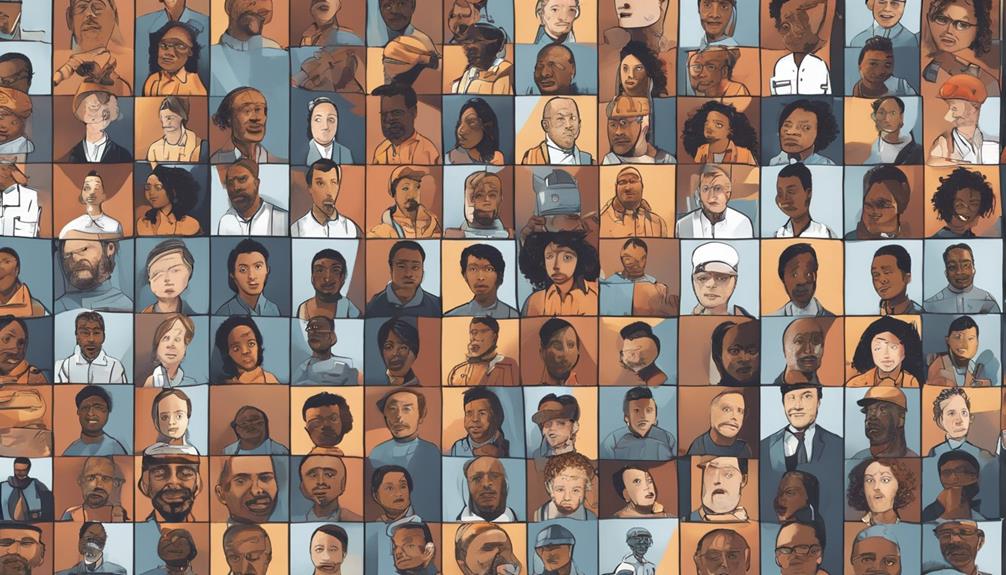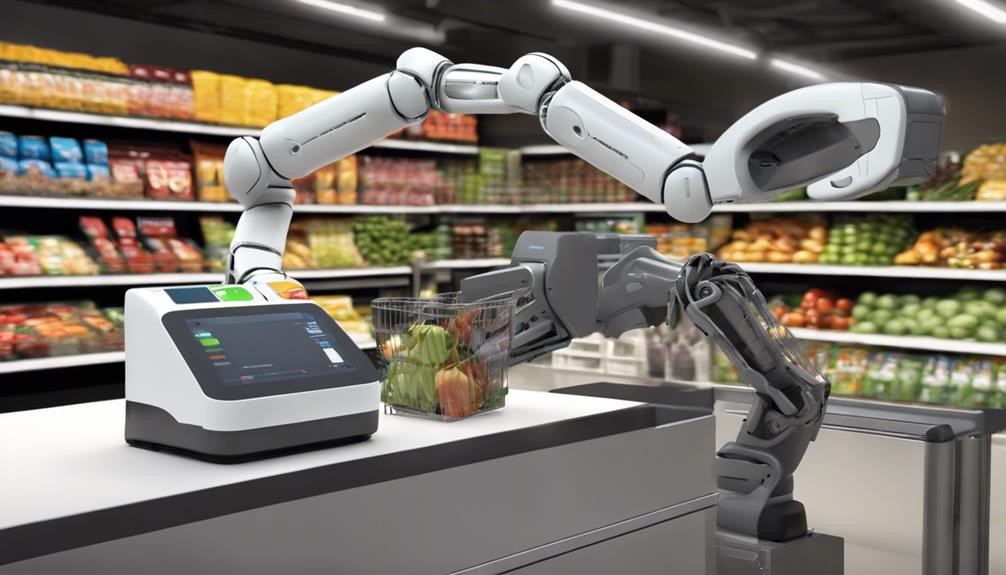In a rapidly evolving landscape where artificial intelligence is increasingly integrated into various industries, the pressing question of how AI is reshaping the job market is clearly apparent.
As AI technologies advance, the impact on traditional job roles becomes more pronounced, prompting a reevaluation of skill sets and career paths.
The intricate interplay between automation and human labor raises critical questions about the future of work, necessitating a deeper understanding of the implications for individuals and societies alike.
The unfolding narrative of AI's influence on jobs invites a closer examination of the nuanced dynamics at play, shedding light on both the challenges and opportunities that lie ahead in this transformative journey.
Key Takeaways
- AI will replace jobs in various sectors by 2025.
- Automation will impact customer service, driving, and programming roles.
- Upskilling in AI-related fields is vital for future career prospects.
- New job roles like AI ethics specialists will emerge alongside replacements.
Types of Jobs AI Is Replacing
The rapid advancement of artificial intelligence (AI) is poised to replace a significant number of jobs across various industries globally by 2025, particularly impacting roles in healthcare, agriculture, and industrial sectors. Specific jobs at risk of being replaced by AI include customer service representatives, car and truck drivers, computer programmers, research analysts, and paralegals.
AI-driven automation and chatbots are increasingly handling inquiries, leading to the potential replacement of customer service representatives. The rise of autonomous vehicles is reducing the need for human drivers, jeopardizing the job security of car and truck drivers. Additionally, AI tools like ChatGPT have the capability to automate coding tasks, posing a threat to the positions of computer programmers.
As AI continues to evolve and demonstrate higher levels of intelligence, these trends suggest a shift in the skills required for the workforce, with some jobs being phased out while new jobs emerge at high levels of AI integration.
Impact on the Labor Market

As artificial intelligence (AI) continues to advance rapidly, its projected impact on the labor market, particularly in terms of job displacement, is a topic of increasing concern and scrutiny worldwide.
AI algorithms and machine learning are automating tasks traditionally performed by humans, affecting a wide range of industries. Manual labor roles are increasingly being taken over by autonomous vehicles and robotics, leading to a decrease in the demand for workers in these fields.
Customer service jobs, once reliant on human interaction and emotional intelligence, are now being transformed by AI, impacting the need for soft skills in these roles. High-skilled positions requiring complex problem-solving abilities are also at risk as AI technology advances.
Market trends indicate a shift towards a more automated workforce, necessitating workers to adapt and acquire new skills to remain relevant in the evolving job market. Understanding the implications of AI on the labor market is crucial for individuals and organizations to navigate the changing landscape effectively.
Future Job Trends With AI
With the rapid advancement of artificial intelligence (AI), future job trends are poised to undergo significant transformations, driven by the integration of AI technologies across various industries.
- New job roles: AI will create 133 million new roles by 2022, offering opportunities for upskilling and reskilling.
- High skill requirements: High school students are pursuing careers in emerging fields due to technology, shaping the future job market.
- Human touch is essential: Despite AI's rise, roles requiring a human touch are likely to remain in demand.
- Skills adaptation: The rise of AI emphasizes the need for workforce skills development and adaptation to emerging technologies.
- AI tools integration: Jobs involving the use of AI systems are expected to be high in demand in the foreseeable future, requiring proficiency in utilizing AI tools effectively.
As AI continues to evolve, the job market will see a shift towards roles that necessitate complex problem-solving, creativity, and interpersonal skills, while routine tasks are likely to be automated. Staying ahead will require individuals to acquire the necessary skills to thrive in this AI-driven landscape.
Adapting to AI in Careers

Adapting to the rapid integration of AI technologies in careers requires a strategic focus on upskilling and specialization to navigate the evolving job market landscape effectively. Professionals who are exposed to AI must recognize that while some traditional roles may be replaced by AI, there are abundant opportunities for individuals who invest in upskilling and acquiring new skills tailored to AI-driven workplaces.
Specializing in AI-related fields can lead to promising career prospects in emerging industries where AI can enhance productivity and innovation. Moreover, the importance of soft skills cannot be understated in this scenario, as continuous learning and development in areas such as communication, critical thinking, and adaptability are crucial for success in AI-integrated environments.
Institutions like Nexford University offering AI specialization programs play a vital role in equipping individuals with the necessary expertise to thrive in an increasingly AI-centric job market. Embracing AI integration not only boosts efficiency and decision-making but also enhances competitiveness, making it imperative for professionals to adapt to the changing landscape by honing their skills in alignment with AI advancements.
Benefits and Concerns of AI in Employment
Given the imminent shift in job dynamics due to the integration of AI technologies, a critical examination of the benefits and concerns surrounding AI in employment is essential for understanding its impact on the workforce.
- AI Will Replace: According to the Future of Jobs Report, AI is projected to replace 85 million jobs globally by 2025, leading to disruptions in hiring practices.
- AI Will Create: AI saves time on tedious tasks and enhances workplace efficiency by redirecting human effort towards more productive tasks.
- Human Workers: New job roles like machine learning engineers and AI ethics specialists are being created, highlighting the opportunities AI brings to the job market.
- Require High: 54% of employees need significant re-skilling by 2022 to adapt to the changes AI brings to the employment landscape.
- Reduce the Need: Businesses can empower employees by upskilling them in AI, reducing disruption and preparing workers for new job opportunities in the AI era.
Frequently Asked Questions
How AI Is Replacing Jobs?
AI is replacing jobs through automation of routine tasks, such as customer service, driving, and data analysis. Industries facing disruption include transportation, technology, and legal services. Jobs requiring complex problem-solving and human interaction are less susceptible to AI replacement.
Which Jobs Will Be Taken Over by Ai?
As technology advances, positions in customer service, driving, programming, research analysis, and paralegal work are at risk of being automated by AI. These roles are susceptible to replacement due to the efficiency and capabilities of artificial intelligence.
Will Artificial Intelligence Take Over My Job?
As technology advances, the integration of artificial intelligence in workplaces raises concerns about job security. While some roles may be replaced by AI due to automation, jobs requiring complex human interactions and specialized skills are less likely to be affected.
How AI Is Changing the Job Market?
AI is reshaping the job market by automating tasks, creating new roles, and increasing efficiency. Industries must adapt to this shift by upskilling workers, fostering innovation, and reevaluating job structures to remain competitive.
Conclusion
In conclusion, the integration of AI in the workforce is reshaping the job landscape, with certain roles being replaced by automation while others are evolving to require more human-centered skills.
As AI continues to advance, it is crucial for individuals and organizations to adapt and embrace the changes to stay competitive in the rapidly evolving job market.
The future of work with AI is a complex and dynamic landscape, where innovation and adaptation will be key to navigating the challenges and opportunities ahead.









